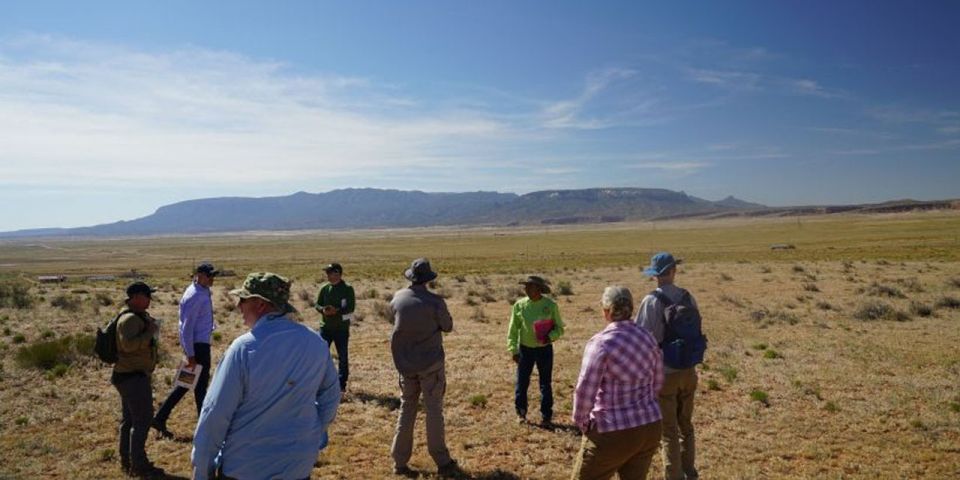Navajo Nation tests tribal law banning uranium transport
Members of the Navajo Nation are challenging the legality of uranium ore transport from a mine in Arizona across tribal lands to a processing facility in Utah.
A 2012 law bans uranium transport on the vast Navajo Nation land, which covers portions of Arizona, New Mexico, and Utah. Navajo Nation president Buu Nygren issued an executive order on Wednesday saying that there must be an agreement before uranium is transported through the reservation.
“We’re taking this stance of interpreting and executing the law to ensure the safety of our people and respect for Navajo sovereignty,” Nygren said in statement. “If you’re going to smuggle uranium into our borders and across our Nation and outside, that’s pretty much illegal. I’m very disappointed that this is happening in this day and age.”
A closer look: Energy Fuels is the largest uranium producer in the U.S. and recently began mining at the Pinyon Plain Mine south of the Grand Canyon to help meet demand for the nuclear fuel. The United States has issued a ban on uranium imports from Russia, historically a major supplier, in response to the invasion in Ukraine.
Chief executive Mark Chalmers said that Energy Fuels has gone “above and beyond” to engage with stakeholders in the area, holding a meeting as recently as July 19 with federal, state, county, and tribal officials in attendance.
“These ore shipments advance the overwhelmingly bipartisan efforts to rebuild domestic nuclear fuel supply chains that have been offshored to adversarial nations like Russia over the past several decades,” Chalmers said.
“Simply a rock”: Uranium ore is natural rock mined from the ground. In the case of the Pinyon Plain Mine, it contains just 1 percent uranium. It is transported in tightly covered, labeled, and placarded vehicles driven by specially licensed and trained operators, all in accordance with applicable laws and regulations. The shipments have been thoroughly reviewed and permitted by state and federal regulators.
“Tens of thousands of trucks have safely transported uranium ore across northern Arizona since the 1980s with no adverse health or environmental effects,” Chalmers said. “Materials with far greater danger are transported every day on every road in the county. Ore is simply natural rock. It won’t explode, ignite, burn, or glow, contrary to what opponents claim.”
Steve Brown, a certified health physicist and Fellow with the Health Physics Society, has studied safety of uranium transport. “The ore contained in these shipments has low levels of natural radiation and, when transported in accordance with applicable laws and regulations, does not represent a threat to the health and safety of the people or environment along the haul route, and there should be no cause for concern.”
Energy Fuels went above and beyond what is required by law to inform and engage communities along the route, including tribal leaders, on safety measures and emergency response, said Chalmers.
Nygren said Energy Fuels drove an estimated 50 tons of uranium ore across the tribe’s land on Tuesday—without giving notice to the Navajo Nation.
Tribal police intended to stop the trucks and send the contents back to the mine but could not catch up. Nygren said he intends to set up roadblocks and stop additional uranium transport until the Navajo Nation establishes regulations.
Energy Fuels began hauling the ore as planned on Tuesday and had informed federal, state, county, and tribal officials more than 10 days earlier about the legal requirements, safety, emergency response, and the imminent shipping of uranium ore, though it didn’t give a specific date. Company spokesperson Curtis Moore said that no one told Energy Fuels that it wasn’t sufficient.
Legal standing: Nygren pointed to Navajo laws regarding the transportation of radioactive materials that have been in place for well over a decade: The Navajo Nation Natural Resources Protection Act of 2005 and the Navajo Nation’s 2012 legislation Radioactive and Related Substances, Equipment, Vehicles, Persons and Materials Transportation Act, he said.
However, the 2012 law exempts state and federal highways that Energy Fuels plans to use as its hauling route. Arizona attorney general Kris Mayes issued a statement on the transport issue, noting that Energy Fuels had vowed to give stakeholders two-week notice ahead of these moves and to provide an emergency plan.
“My office is currently researching our options, but I remain deeply committed to doing everything in my power to protect the health and safety of all Arizonans,” Mayes said. “Hauling radioactive materials through rural Arizona, including across the Navajo Nation, without providing notice or transparency and without providing an emergency plan is unacceptable.”
Navajo Nation attorney general Ethel Branch said that anyone who comes into Navajo territory must act responsibly and comply with tribal laws, “particularly with something as sensitive as uranium, where there is a long legacy of contamination and disproportionate impact to the Navajo people,” she said.
In its statement, Energy Fuels said previous uranium mining practices “unacceptably continue to impact many Navajo people today,” but the company looks forward to open, good-faith discussions.
“Fortunately, today’s industry is substantially improved from the industry of decades past, as we are heavily regulated and today’s legal framework is fully protective of human health and environment,” the statement reads. “It is imperative that we work together for a safe and secure clean energy future.”


